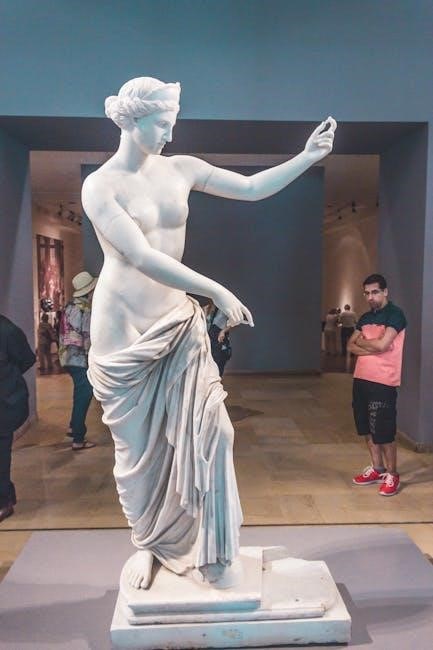suzan lori parks venus pdf
Suzan-Lori Parks’ Venus explores race, identity, and exploitation through Sarah Baartman’s story, blending drama, poetry, and comedy with a carnival metaphor to highlight commodification and objectification․
1․1 Overview of the Play
Venus by Suzan-Lori Parks recounts the fictionalized life of Sarah Saartjie Baartman, a South African woman exploited in 19th-century Europe for her physical features․ The play blends drama, poetry, and comedy, using a carnival freak-show metaphor to critique themes of objectification, racial exploitation, and commodification of the body, offering a powerful commentary on historical and societal injustices․
1․2 Historical Context of Sarah Baartman
Sarah Saartjie Baartman, known as the “Hottentot Venus,” was a South African woman exploited in 19th-century Europe for her physical features․ Displayed in freak shows, her body was objectified due to her large buttocks and perceived exoticness․ Her story reflects colonial racism, scientific exploitation, and the commodification of Black bodies, making her a symbol of racial and gendered oppression in history․

Plot Structure and Key Scenes
The play recounts Sarah Baartman’s tragic journey, from her arrival in Europe to her exploitation in freak shows, using a carnival metaphor to highlight her objectification and loss of dignity․
2․1 The Life of Sarah Saartjie Baartman
Sarah Baartman, known as the “Venus Hottentot,” was a South African woman exploited in 19th-century Europe for her physical features․ The play fictionalizes her life, depicting her journey from captivity to exploitation, emphasizing her resilience and the dehumanizing effects of colonialism and scientific curiosity, as revealed through historical accounts and dramatic reinterpretation․
2․2 The Carnival Freak-Show Metaphor
The carnival freak-show metaphor in Venus symbolizes Sarah Baartman’s exploitation, reducing her to a spectacle for European curiosity․ Her physical features, particularly her buttocks, are commodified, mirroring the objectification of Black bodies․ The metaphor underscores themes of dehumanization and the performative nature of race, blending drama and poetry to critique colonial commodification and the voyeuristic gaze․
Themes in “Venus”
Venus explores themes of exploitation, objectification, and commodification, delving into race and identity through Sarah Baartman’s story, highlighting societal devaluation of Black bodies and humanity․
3․1 Exploitation and Objectification
Venus examines the exploitation and objectification of Sarah Baartman, showcasing her commodification as a “freak” attraction in 19th-century Europe․ Her body, particularly her buttocks, was fetishized and exploited for profit, reducing her to a spectacle․ The play critiques how societal structures perpetuate the dehumanization of marginalized individuals, emphasizing the intersection of race, gender, and economic exploitation․
3․2 Identity and Race
Venus delves into themes of identity and race through Sarah Baartman’s experience, illustrating her struggle with self-perception amidst external objectification․ The play explores how racial stereotypes and colonialism erase individuality, reducing her to a symbol of “otherness․” Parks highlights the tension between Baartman’s personal identity and the imposed narratives that define her in a society dominated by racial hierarchies and exploitation․
3․3 Commodification of the Body
The play critiques the commodification of Sarah Baartman’s body, displayed for profit in Europe․ Her physical features, particularly her buttocks, are exploited as a curiosity․ Parks examines how her body becomes a commodity, stripped of humanity, reflecting broader themes of exploitation and objectification of Black bodies in colonial and capitalist systems, resonating with historical and modern commodification practices․
Characters and Their Roles
Key characters include Sarah Saartjie Baartman, the central figure, and the Man, later Baron Docteur, who shifts roles from exploiter to complex lover․ The Chorus adds narrative depth․
4․1 Sarah Saartjie Baartman (The Venus Hottentot)
Sarah Saartjie Baartman, known as the Venus Hottentot, is the play’s central figure․ She is portrayed as a complex, multifaceted character, embodying both resilience and vulnerability․ Her life is marked by exploitation, as she is paraded across Europe for her physical features․ The play explores her journey from a colonial subject to a symbol of resistance, highlighting her humanity amidst objectification․
4․2 The Man (Later Baron Docteur)
The Man, later Baron Docteur, is a pivotal character whose relationship with Sarah evolves from exploitation to a complex connection․ He represents both her captor and supposed lover, advancing his career through her exploitation․ His character symbolizes the intersecting dynamics of power, control, and pseudo-intimacy, revealing the ethical contradictions of scientific curiosity and personal ambition intertwined with racial objectification․
4․3 The Chorus and Supporting Characters
The chorus in Venus serves as a collective voice, representing groups like the spectators and human wonders, who comment on Sarah’s exploitation and societal norms․ Supporting characters, such as the Man’s brother and the Negro Resurrectionist, highlight various forms of exploitation, whether scientific, commercial, or moral, enriching the play’s exploration of power dynamics․

Historical and Cultural Significance
Venus sheds light on the exploitative treatment of Sarah Baartman, highlighting colonial racism and sexism, while challenging modern audiences to reflect on historical and ongoing injustices․
5․1 The Real-Life Story of Sarah Baartman
Sarah Baartman, the “Hottentot Venus,” was a South African woman exploited in 19th-century Europe for her physical features․ Exhibited in cages, she faced racism and objectification, becoming a symbol of colonial oppression․ Her life ended in poverty and illness, with her body subjected to further scientific exploitation even after death, highlighting the brutal realities of colonialism and commodification of Black bodies․
5․2 The Play’s Relevance to Modern Society
Venus remains a powerful commentary on modern societal issues, addressing exploitation, commodification, and identity․ Suzan-Lori Parks’ exploration of Sarah Baartman’s story resonates with contemporary discussions on race, gender, and body image․ The play challenges audiences to reflect on historical and ongoing objectification, particularly of Black women, urging conversations about empowerment and representation in today’s world․
Literary Style and Devices
Suzan-Lori Parks employs a unique blend of poetry, comedy, and drama, using the carnival freak-show metaphor to explore themes symbolically, blending genres for impactful storytelling․
6․1 Use of Poetry and Comedy
Suzan-Lori Parks uniquely blends poetry and comedy in Venus, creating a lyrical yet provocative narrative․ Poetry elevates emotional depth, while comedy contrasts the grim reality, highlighting exploitation and objectification through irony and absurdity, making the play both poignant and thought-provoking, while challenging audience perspectives on race, identity, and commodification of the body, blending genres for a powerful theatrical experience․
6․2 Dramatic and Symbolic Elements
Suzan-Lori Parks employs dramatic and symbolic elements in Venus, using the carnival freak-show metaphor to highlight exploitation․ The circus-like setting symbolizes Baartman’s commodification, while poetic dialogue and chorus interactions emphasize her dehumanization․ The contrast between scientific objectification and Baartman’s humanity underscores themes of identity and race, making the play a powerful exploration of historical and cultural exploitation through symbolic storytelling and dramatic intensity․
Critical Reception and Reviews
Critics acclaim Suzan-Lori Parks’ Venus for its bold portrayal of Sarah Baartman’s story, blending humor and drama․ While praised for its unique style, debates arise about its historical accuracy and representation․
7․1 Positive Reviews and Acclaim
Venus by Suzan-Lori Parks has received widespread critical acclaim for its powerful exploration of race, identity, and exploitation․ Critics praise Parks’ innovative use of poetry, comedy, and drama, as well as her unflinching examination of Sarah Baartman’s tragic story․ The play’s carnival freak-show metaphor is highlighted as a hauntingly powerful critique of commodification and objectification, resonating deeply with audiences and scholars alike․
7․2 Critical Analysis and Debates
Scholars and critics have debated Venus’s portrayal of Sarah Baartman, questioning its historical accuracy and the ethics of reimagining her exploitation․ Some argue that the play’s blend of comedy and drama undermines the gravity of Baartman’s suffering, while others praise its bold approach to confronting colonialism and racism, sparking vital discussions on representation and historical memory in contemporary theatre․
Availability of “Venus” in PDF Format
Venus by Suzan-Lori Parks is available in PDF format through various online sources, including Open Library and study guides, though users should verify the legality of downloads․
8․1 Download Options and Sources
Venus by Suzan-Lori Parks is available as a PDF through platforms like Open Library, study guides, and academic databases․ Users can access it via Theatre Communications Group or purchase from online retailers․ Ensure downloads comply with copyright laws and support ethical publishing practices to respect the author’s work and intellectual property rights․
8․2 Legal and Ethical Considerations
Downloading Venus as a PDF requires adherence to copyright laws․ Ensure sources are legal and respect intellectual property rights․ Unauthorized distribution or downloading from unverified sites violates ethical standards and may infringe on the author’s rights, undermining support for playwrights and literary works․ Always opt for authorized platforms to access the play responsibly․

Study Guides and Educational Resources
Study guides for Venus offer summaries, analysis, and discussion questions, aiding students in understanding themes, characters, and historical context, while fostering critical thinking and deeper engagement with the play․
9․1 Summary and Analysis
Venus by Suzan-Lori Parks is a powerful exploration of race, identity, and exploitation, centered on the life of Sarah Saartjie Baartman․ The play delves into her journey from South Africa to Europe, where she was objectified for her physical features․ Through a blend of drama, poetry, and dark comedy, Parks critiques the commodification of the Black body and the dehumanizing effects of colonialism․ Study guides provide in-depth analysis of key themes, character development, and historical context, helping readers unpack the play’s complex layers and its resonance in contemporary discussions of race and identity․
9․2 Themes and Discussion Questions
Venus explores themes of exploitation, objectification, and identity, highlighting the commodification of the Black body․ Discussion questions include: How does the play portray Sarah Baartman’s exploitation? How does the carnival metaphor reflect societal treatment of marginalized groups? What commentary does Parks offer on race and identity? How does the play resonate with modern discussions of body autonomy and representation?
Suzan-Lori Parks’ Other Works
Suzan-Lori Parks, a Pulitzer Prize-winning playwright, is known for works like Topdog/Underdog and Father Comes Home From the Wars, exploring race, identity, and history with innovative storytelling․
10․1 Notable Plays and Awards
Suzan-Lori Parks, a Pulitzer Prize-winning playwright, is renowned for works like Topdog/Underdog, which earned her the Pulitzer in 2002, and Father Comes Home From the Wars․ Her plays often explore themes of race, identity, and history, solidifying her impact on contemporary theatre and earning her numerous accolades for her innovative storytelling and profound social commentary․
10․2 Her Impact on Contemporary Theatre
Suzan-Lori Parks’ innovative storytelling and exploration of race, gender, and identity have reshaped contemporary theatre․ Her unique blend of poetry, comedy, and drama challenges traditional narratives, offering fresh perspectives on historical and social issues․ Parks’ work continues to inspire playwrights and audiences alike, cementing her legacy as a groundbreaking voice in modern theatre․

The Play’s Adaptations and Performances
Venus has seen powerful stage productions worldwide, with its carnival freak-show metaphor resonating deeply, evoking strong audience reactions and sparking crucial conversations about race and exploitation․
11․1 Stage Productions and Adaptations
Venus has been adapted into numerous stage productions, blending drama and comedy to recount Sarah Baartman’s story․ The play’s carnival freak-show metaphor vividly portrays her exploitation, evoking strong audience reactions and fostering dialogue about race and commodification․ Productions worldwide have highlighted Parks’ unique storytelling, ensuring the play’s impactful themes resonate with contemporary audiences․
11․2 Audience Reactions and Performances
Audiences have responded emotionally to Venus, praising its blend of drama and comedy․ Performances often leave viewers reflecting on race and commodification․ The carnival metaphor enhances the play’s emotional impact, fostering dialogue about exploitation and identity․ Parks’ storytelling resonates deeply, making Venus a memorable theatrical experience that challenges and engages audiences worldwide․
Venus by Suzan-Lori Parks is a powerful exploration of exploitation, identity, and commodification․ The play’s use of carnival metaphors and blending of drama with poetry leaves a lasting impact, challenging audiences to reflect on historical and contemporary societal issues․
12․1 Final Thoughts on “Venus”
Venus is a profound critique of exploitation and objectification, offering a poignant reflection on the commodification of the human body․ Suzan-Lori Parks masterfully blends humor, drama, and poetry to highlight the resilience and tragedy of Sarah Baartman, leaving readers with a lasting appreciation for her story and its relevance to contemporary societal issues․
12․2 The Lasting Legacy of the Play
Venus remains a powerful critique of exploitation and commodification, resonating deeply with contemporary discussions on race, gender, and identity․ Its carnival metaphor and blending of genres inspire new adaptations, ensuring its relevance in theatre history and its influence on modern storytelling about marginalized voices and historical injustices․


